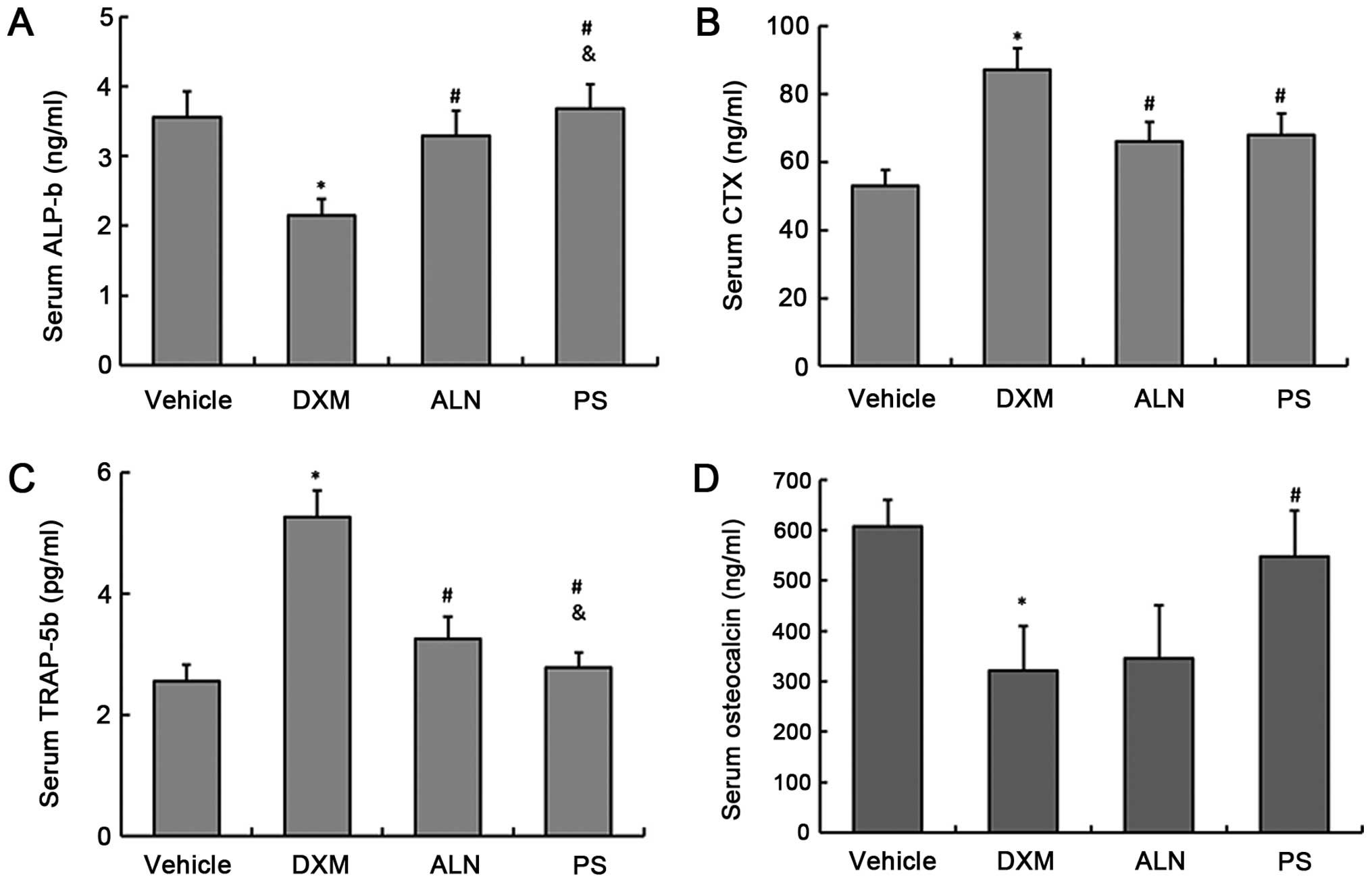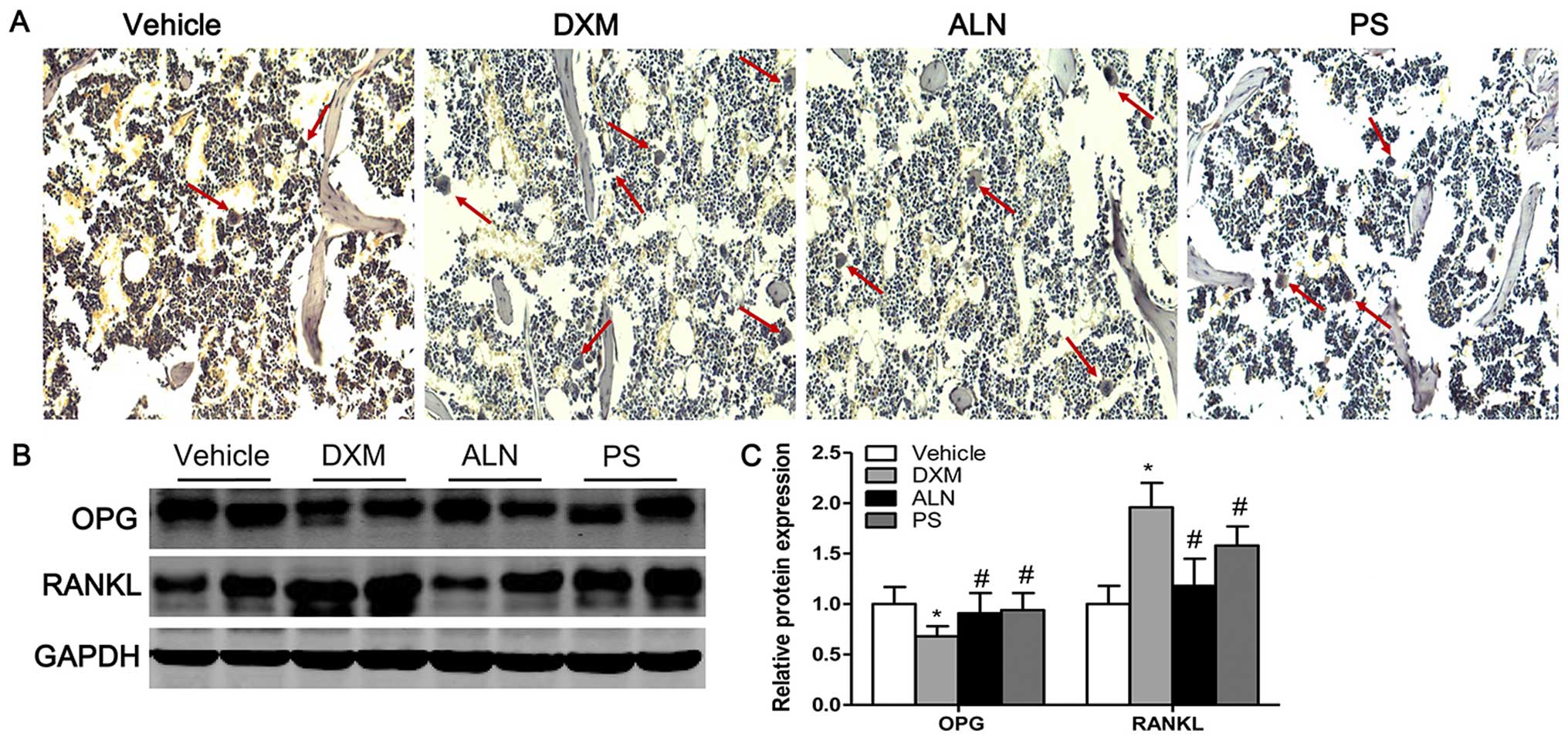|
1
|
Zhou DA, Zheng HX, Wang CW, Shi D and Li
JJ: Influence of glucocorticoids on the osteogenic differentiation
of rat bone marrow-derived mesenchymal stem cells. BMC
Musculoskelet Disord. 15:2392014. View Article : Google Scholar : PubMed/NCBI
|
|
2
|
Scudeletti M, Musselli C, Lanza L, Peirano
L, Puppo F and Indiveri F: The immunological activity of
corticosteroids. Recenti Prog Med. 87:508–515. 1996.In Italian.
PubMed/NCBI
|
|
3
|
Lin H, Wei B, Li G, Zheng J, Sun J, Chu J,
Zeng R and Niu Y: Sulforaphane reverses glucocorticoid-induced
apoptosis in osteoblastic cells through regulation of the Nrf2
pathway. Drug Des Devel Ther. 8:973–982. 2014. View Article : Google Scholar : PubMed/NCBI
|
|
4
|
Steinbuch M, Youket TE and Cohen S: Oral
glucocorticoid use is associated with an increased risk of
fracture. Osteoporos Int. 15:323–328. 2004. View Article : Google Scholar : PubMed/NCBI
|
|
5
|
Van Staa TP, Laan RF, Barton IP, Cohen S,
Reid DM and Cooper C: Bone density threshold and other predictors
of vertebral fracture in patients receiving oral glucocorticoid
therapy. Arthritis Rheum. 48:3224–3229. 2003. View Article : Google Scholar : PubMed/NCBI
|
|
6
|
Bitto A, Polito F, Burnett B, Levy R, Di
Stefano V, Armbruster MA, Marini H, Minutoli L, Altavilla D and
Squadrito F: Protective effect of genistein aglycone on the
development of osteonecrosis of the femoral head and secondary
osteoporosis induced by methylprednisolone in rats. J Endocrinol.
201:321–328. 2009. View Article : Google Scholar : PubMed/NCBI
|
|
7
|
Reid IR: Glucocorticoid osteoporosis -
mechanisms and management. Eur J Endocrinol. 137:209–217. 1997.
View Article : Google Scholar : PubMed/NCBI
|
|
8
|
Capozzi A, Casa SD, Altieri B and
Pontecorvi A: Chronic low-dose glucocorticoid inhalatory therapy as
a cause of bone loss in a young man: case report. Clin Cases Miner
Bone Metab. 10:199–202. 2013.
|
|
9
|
De Vries F, Bracke M, Leufkens HG, Lammers
JW, Cooper C and Van Staa TP: Fracture risk with intermittent
high-dose oral glucocorticoid therapy. Arthritis Rheum. 56:208–214.
2007. View Article : Google Scholar
|
|
10
|
McIlwain HH: Glucocorticoid-induced
osteoporosis: Pathogenesis, diagnosis, and management. Prev Med.
36:243–249. 2003. View Article : Google Scholar : PubMed/NCBI
|
|
11
|
Yoon HY, Won YY and Chung YS: Poncirin
prevents bone loss in glucocorticoid-induced osteoporosis in vivo
and in vitro. J Bone Miner Metab. 30:509–516. 2012. View Article : Google Scholar : PubMed/NCBI
|
|
12
|
Jahn K, Lara-Castillo N, Brotto L, Mo CL,
Johnson ML, Brotto M and Bonewald LF: Skeletal muscle secreted
factors prevent glucocorticoid-induced osteocyte apoptosis through
activation of beta-catenin. Eur Cell Mater. 24:197–210. 2012.
|
|
13
|
Ma X, Zhang X, Jia Y, Zu S, Han S, Xiao D,
Sun H and Wang Y: Dexamethasone induces osteogenesis via regulation
of hedgehog signalling molecules in rat mesenchymal stem cells. Int
Orthop. 37:1399–1404. 2013. View Article : Google Scholar : PubMed/NCBI
|
|
14
|
Duzen O, Erkoc R, Begenik H, Soyoral YU
and Aldemir MN: The course of hypercalciuria and related markers of
bone metabolism parameters associated with corticosteroid
treatment. Ren Fail. 34:338–342. 2012. View Article : Google Scholar : PubMed/NCBI
|
|
15
|
Kinoshita Y, Masuoka K, Miyakoshi S,
Taniguchi S and Takeuchi Y: Vitamin D insufficiency underlies
unexpected hypocalcemia following high dose glucocorticoid therapy.
Bone. 42:226–228. 2008. View Article : Google Scholar
|
|
16
|
Mori-Okamoto J, Otawara-Hamamoto Y, Yamato
H and Yoshimura H: Pomegranate extract improves a depressive state
and bone properties in menopausal syndrome model ovariectomized
mice. J Ethnopharmacol. 92:93–101. 2004. View Article : Google Scholar : PubMed/NCBI
|
|
17
|
Saravani M, Kazemi Mehrjerdi H, Mirshahi A
and Afkhami Goli A: Protective effects of pomegranate seed oil on
ovariectomized rats as a model of postmenopausal osteoporosis: a
multi-detector computed tomography evaluation. Vet Res Forum.
5:263–267. 2014.
|
|
18
|
Tzulker R, Glazer I, Bar-Ilan I, Holland
D, Aviram M and Amir R: Antioxidant activity, polyphenol content,
and related compounds in different fruit juices and homogenates
prepared from 29 different pomegranate accessions. J Agric Food
Chem. 55:9559–9570. 2007. View Article : Google Scholar : PubMed/NCBI
|
|
19
|
Hasnaoui N, Wathelet B and Jiménez-Araujo
A: Valorization of pomegranate peel from 12 cultivars: dietary
fibre composition, antioxidant capacity and functional properties.
Food Chem. 160:196–203. 2014. View Article : Google Scholar : PubMed/NCBI
|
|
20
|
Kim ND, Mehta R, Yu W, Neeman I, Livney T,
Amichay A, Poirier D, Nicholls P, Kirby A, Jiang W, et al:
Chemopreventive and adjuvant therapeutic potential of pomegranate
(Punica granatum) for human breast cancer. Breast Cancer Res Treat.
71:203–217. 2002. View Article : Google Scholar : PubMed/NCBI
|
|
21
|
Spilmont M, Léotoing L, Davicco MJ,
Lebecque P, Mercier S, Miot-Noirault E, Pilet P, Rios L, Wittrant Y
and Coxam V: Pomegranate seed oil prevents bone loss in a mice
model of osteoporosis, through osteoblastic stimulation,
osteoclastic inhibition and decreased inflammatory status. J Nutr
Biochem. 24:1840–1848. 2013. View Article : Google Scholar : PubMed/NCBI
|
|
22
|
Lou Q-Q, Zhang Y-F, Zhou Z, Shi YL, Ge YN,
Ren DK, Xu HM, Zhao YX, Wei WJ and Qin ZF: Effects of
perfluorooctanesulfonate and perfluorobutanesulfonate on the growth
and sexual development of Xenopus laevis. Ecotoxicology.
22:1133–1144. 2013. View Article : Google Scholar : PubMed/NCBI
|
|
23
|
Shuid AN and Mohamed IN: Pomegranate use
to attenuate bone loss in major musculoskeletal diseases: an
evidence-based review. Curr Drug Targets. 14:1565–1578. 2013.
View Article : Google Scholar : PubMed/NCBI
|
|
24
|
Spilmont M, Léotoing L, Davicco MJ,
Lebecque P, Mercier S, Miot-Noirault E, Pilet P, Rios L, Wittrant Y
and Coxam V: Pomegranate and its derivatives can improve bone
health through decreased inflammation and oxidative stress in an
animal model of postmenopausal osteoporosis. Eur J Nutr.
53:1155–1164. 2014. View Article : Google Scholar
|
|
25
|
Mok CC, Ho LY and Ma KM: Switching of oral
bisphosphonates to denosumab in chronic glucocorticoid users: a
12-month randomized controlled trial. Bone. 75:222–228. 2015.
View Article : Google Scholar : PubMed/NCBI
|
|
26
|
Bitto A, Burnett BP, Polito F, Levy RM,
Marini H, Di Stefano V, Irrera N, Armbruster MA, Minutoli L,
Altavilla D and Squadrito F: Genistein aglycone reverses
glucocorticoid-induced osteoporosis and increases bone breaking
strength in rats: a comparative study with alendronate. Br J
Pharmacol. 156:1287–1295. 2009. View Article : Google Scholar : PubMed/NCBI
|
|
27
|
Lin H, Gao X, Chen G, Sun J, Chu J, Jing
K, Li P, Zeng R and Wei B: Indole-3-carbinol as inhibitors of
glucocorticoid-induced apoptosis in osteoblastic cells through
blocking ROS-mediated Nrf2 pathway. Biochem Biophys Res Commun.
460:422–427. 2015. View Article : Google Scholar : PubMed/NCBI
|
|
28
|
Jia D, O'Brien CA, Stewart SA, Manolagas
SC and Weinstein RS: Glucocorticoids act directly on osteoclasts to
increase their life span and reduce bone density. Endocrinology.
147:5592–5599. 2006. View Article : Google Scholar : PubMed/NCBI
|
|
29
|
Yongtao Z, Kunzheng W, Jingjing Z, Hu S,
Jianqiang K, Ruiyu L and Chunsheng W: Glucocorticoids activate the
local renin-angiotensin system in bone: possible mechanism for
glucocorticoid-induced osteoporosis. Endocrine. 47:598–608. 2014.
View Article : Google Scholar : PubMed/NCBI
|
|
30
|
Tamura Y, Kawao N, Yano M, Okada K,
Okumoto K, Chiba Y, Matsuo O and Kaji H: Role of plasminogen
activator inhibitor-1 in glucocorticoid-induced diabetes and
osteopenia in mice. Diabetes. 64:2194–2206. 2014. View Article : Google Scholar
|
|
31
|
Zhang Y, Diao TY, Wang L, Che CT and Wong
MS: Protective effects of water fraction of Fructus Ligustri Lucidi
extract against hypercalciuria and trabecular bone deterioration in
experimentally type 1 diabetic mice. J Ethnopharmacol. 158(Pt A):
239–245. 2014. View Article : Google Scholar : PubMed/NCBI
|
|
32
|
Sonntag J and Gaude M: Effect of
dexamethasone and spironolactone therapy in calcium and phosphate
homeostasis in premature infants with a birth weight under 1,500 g.
Klin Padiatr. 210:354–357. 1998.In German. View Article : Google Scholar : PubMed/NCBI
|
|
33
|
Lin YJ, Yeh TF, Lin HC, Wu JM, Lin CH and
Yu CY: Effects of early postnatal dexamethasone therapy on calcium
homeostasis and bone growth in preterm infants with respiratory
distress syndrome. Acta Paediatr. 87:1061–1065. 1998. View Article : Google Scholar : PubMed/NCBI
|
|
34
|
Hoenderop JG, Nilius B and Bindels RJ:
Calcium absorption across epithelia. Physiol Rev. 85:373–422. 2005.
View Article : Google Scholar
|
|
35
|
Alexander RT, Rievaj J and Dimke H:
Paracellular calcium transport across renal and intestinal
epithelia. Biochem Cell Biol. 92:467–480. 2014. View Article : Google Scholar : PubMed/NCBI
|
|
36
|
Nijenhuis T, Hoenderop JG and Bindels RJ:
TRPV5 and TRPV6 in Ca2+ (re)absorption: regulating
Ca2+ entry at the gate. Pflugers Arch. 451:181–192.
2005. View Article : Google Scholar : PubMed/NCBI
|
|
37
|
Rainone F, Arcidiacono T, Terranegra A,
Aloia A, Dogliotti E, Mingione A, Spotti D, Francucci CM, Soldati L
and Vezzoli G: Calcium sensing receptor and renal mineral ion
transport. J Endocrinol Invest. 34(Suppl): 8–12. 2011.
|





















